|
NEW CRITIC ON THE (CHOPPING) BLOCK
It was a pleasure, as it always is, to give a talk to the discerning and well-read ‘customers’ (as we now have to call them) of Witham Library in Essex as a warm-up event for this month’s Essex Book Festival, the highlight of which this year will be Peter Lovesey giving the annual Dorothy L. Sayers Lecture on 23rd March.
It was a triple pleasure to do so in the company of fellow speakers Seona Ford, of the Dorothy L. Sayers Society, and the rarely-photographed Alison Bruce, the author of Cambridge Blue and The Siren.
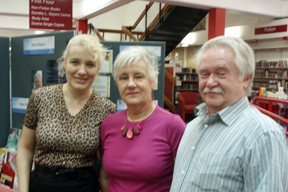
I learn from Alison, however, that library-goers can also be harsh critics, some of them determined to follow in the footsteps of such literary arbiters of taste as Mary Whitehouse, Witchfinder-General Matthew Hopkins and Ghengis Khan.
Alison’s debut novel, Cambridge Blue, has, it seems, caused outrage and disgust though not, as one might expect, in Cambridge (or even Tunbridge Wells), but rather in the leafy suburbs of Edgebaston, which I believe to be somewhere near Birmingham. A ‘Mrs E.’ was so outraged that she actually sent a hand-written letter to the chairman of publishers Constable & Robinson, rife with vitriolic indignation, stating that she thought the book “not worth publishing” a hypothesis proved beyond doubt by “the tawdriness of Alison Bruce’s dust-jacket photograph”!
Now I have always said that one is never too old to learn and I freely admit that in 21 years of reviewing crime fiction (roughly 980 titles) it had not occurred to me that to save time, one shouldn’t actually read the book, but base one’s review on the tawdriness or otherwise of the author’s mug-shot. It is a practice I will adopt from now on.
Yet the uncompromising ‘Mrs E.’ has clearly read Cambridge Blue and proves this by referring to “the fellatio episode” which I have to admit I had forgotten or missed and very much regret that ‘Mrs E.’ did not provide a page reference.
I am sure such customer feedback was much appreciated by the chairman of Constable & Robinson; so much so that he must have thought long and hard before proceeding with the paperback of Alison’s second novel The Siren (which for legal reasons I did not review) in July and the hardback of her third, The Calling in August.
One thing which might have swayed him was the acerbic Mrs E’s parting shot at the end of her letter: “Fortunately, I didn’t buy a copy; I borrowed one from a library.” The library, of course, did have the good sense to buy one.
MORE CHAMPAGNE, VICAR?
I have already received an invitation to an event in July which, one would think, had been tailor-made to my specifications.
A well-known and highly-respected publisher is throwing a “Champagne Tea Party” to celebrate its bestselling authors attending some sort of crime festival in the northern spa town of Harrogate, which sounds much more to my taste than the old sort of tea party with the curly-edged cucumber sandwiches and thinly sliced Battenburg cake.
Sadly, I will be unable to attend as the Exclusion Order – some would call it a fatwah – taken out on me by the organisers of the ‘festival’ in question several years ago is still in force. (In Yorkshire there is no such thing as a Statute of Limitations, or time off for good behaviour.)
However, I think the concept of a Champagne Tea Party is an excellent one and I will urge other publishers to adopt the practice.
YES, MORE CHAMPAGNE PLEASE
One publisher it seems already has, for champagne – and copious quantities of it – was the only drink served at the annual Orion crime party, along with delicate canapés hand crafted by that fashionable Covent Garden catering company Recession? What Recession?
I was hoping to discover why their author, former barrister Tom Winship, had abandoned the pen-name of John Connor which he has been using successfully since 2003, reverting to his real name for The Opposite of Mercy, to be published in June.
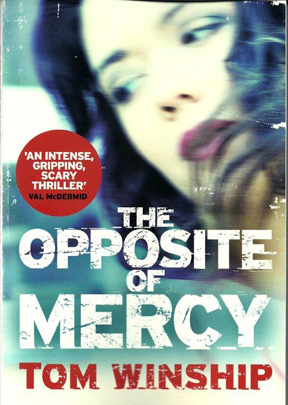
Sadly, for legal reasons I was unable to attend.....and now will never know.
BLITZING THE POSTMAN
I really will have to have a serious word with our normally loyal postman who happily trudges up the drive to Ripster Hall every morning, sometimes breaking into an impressive sprint if I have forgotten to chain up the dogs.
Usually trustworthy and invariably honest, he has once again failed to deliver an invitation to a red-carpet premier for a Ken Bruen film.
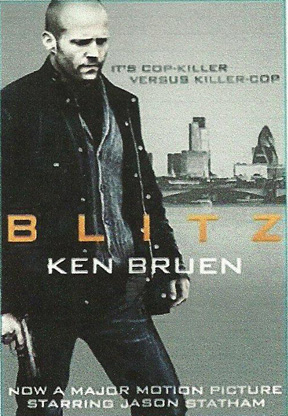
This time it is for the movie Blitz from Ken’s book of the same name from 2002 which has now been reissued by Transworld to tie in with the film starring that venerable thespian Jason Statham.
IN GREENLAND’S PLEASANT LAND
Thrillers set in Greenland, or Kalaalilit Nunaat as it is more properly called, are not unknown; but they are rare.
White Heat by M.J. McGrath has no connection with Raoul Walsh’s famous gangster movie of 1949, but looks fascinating, set way above the Arctic Circle with a female Inuit hunter and guide as the lead character.

Author Melanie McGrath has previously written non-fiction but has switched to “M.J.” for this, her first foray into fiction. She has travelled extensively in the Arctic where she “narrowly escaped wolves” on several occasions. As she hails originally from Essex, one is tempted to say “no change there then”, but her knowledge of the Inuits is not in doubt as one of her non-fiction bestsellers was The Long Exile, the story of the enforced relocation of the Inuits to Ellesmere Island, where White Heat is set.
I have a sneaking suspicion that her novel is very good even without opening it, though my logic may be flawed.
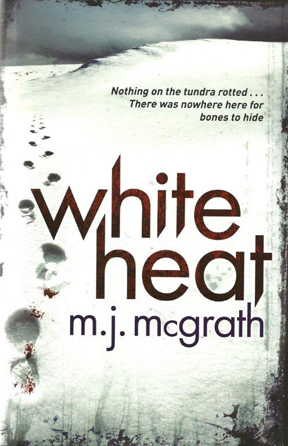
When the first copies of a promising new book arrive at a publishing house, they are often fallen upon eagerly by the overworked and underpaid minions who toil at the coalface. Occasionally, this means that the copies sent out to reviewers contain small but vital clues (to the discerning expert) that the book has already been enjoyed by someone. In their frantic excitement to get the first sight of a book (about which there is said to be a ‘buzz’ or a ‘positive vibe’), the poor dears who sneak a quick free read sometimes leave tell-tale signs: perhaps the wrapper from an Amaretti biscotti or a Starbucks’ voucher used as a book-mark, or the stub of a ticket to the opera caught in the dust-jacket flap and once, oddly, a suggestive trace of lipstick....
However, the review copy of White Heat which reached me from those exclusive publishers Mantle had obviously been appreciated by someone who found it so exciting that they spilled droplets of red wine down the endpapers. An Argentinian Shiraz, unless I’m very much mistaken.
And just to highlight further how strongly they feel about their own in-house product, those voracious readers at Mantle have actually ‘stripped’ the poor publicity department of proof copies of Chris Morgan Jones’ debut thriller An Agent of Deceit, which they plan to publish in May.
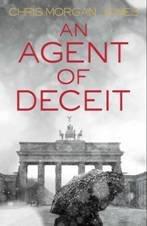
As a consequence, distinguished reviewers and eminent commentators on the mystery scene such as myself have had to register on a waiting list in the hope that one may become available at some point in the next two months.
|
NO HIDING PLACE FOR DIXON OF BRIGHTON ROCK
It may be the remake of the film Brighton Rock (a film, some would argue, like True Grit which didn’t actually need remaking) currently going the rounds, but there seems to be a distinct whiff of retro in the foggy, smoke-filled air, with two new crime novels published almost simultaneously and both set in the post war period.

First out of the blocks is No Hearts, No Roses by Colin Murray, from those sophisticated Surrey publishers Severn House, which is set in London in 1955 and introduces a jazz-loving, laid-back amateur sleuth called Tony Gérard.
Another new detective on the scene is former soldier and policeman Douglas Brodie (not to be confused with Kate Atkinson’s Jackson Brodie), who makes his first appearance in The Hanging Shed by Gordon Ferris, which is set in Glasgow in 1946.
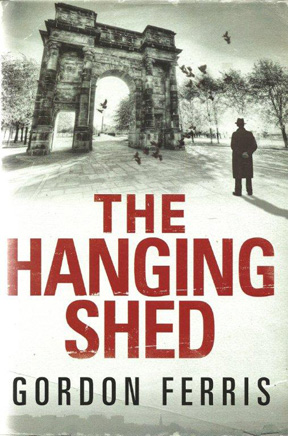
There is nothing retro about the book’s publication process though, as it has – I am told – been available as something called ‘an e-book’ for almost two months.
It is a phrase I hear often these days, even in polite society, although in my youth in Yorkshire it was common parlance. Every time a Yorkshireman went into a public library, it was traditionally incumbent upon him to say loudly: “Eee, books”.
SEEING THE LIGHT
It was no inconvenience whatsoever for me to interrupt my regular visit to The British Museum (where I often act as a voluntary guide showing foreign visitors in which rooms their heritage now resides) to take luncheon with my young colleague Jake Kerridge, of that once-great newspaper the Daily Telegraph, and the directors of the dynamic Bitter Lemon Press.
In fact, I had been very much looking forward to the event, for I finally got the chance to meet fellow archaeologist and author Maria Verbena (‘Ben’) Pastor.
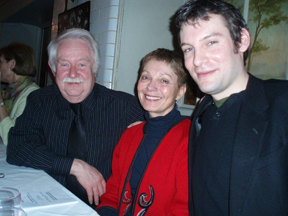
Apart from being an academic and archaeologist, currently digging just south of Milan, Ben has also penned successful thrillers set in WW2 and in 4th century Rome, although I believe Lumen to be the first she has published in the UK, courtesy of those innovative people at Bitter Lemon.
Set in Poland, in the weeks after the German invasion in 1939, Lumen is an intelligent, densely-woven hybrid of thriller, detective story and novel about Catholicism as it falls to the occupying Germans to investigate the shooting of the mystical Mother Superior of a Cracow nunnery.
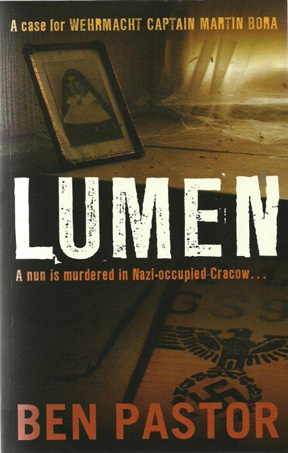
Wehrmacht Captain Martin Bora (actually, the rather aristocratic Freiherr von Bora) is assigned the case, aided and abetted by a visiting American priest on a mission to assess the dead Mother Superior for beatification, and then things get really complicated when Bora’s room-mate, the randy Major Retz, is also found dead in suspicious circumstances. As the reluctant detective nibbles away at the murder puzzle(s), he finds himself at risk from Nazi hardliners when he begins to doubt the cause he is fighting for as he realises the horror of the Nazi master plan for conquered Poland.
I found this thriller element and Bora’s growing sense of disgust and fear far more interesting than the detective story (although that is logically, if ironically, thought out) and the book is crammed with fascinating characters such as Bora’s wonderful father-in-law, who makes a far-too-brief appearance, his wife (who doesn’t actually appear at all, but that’s the point) and a race-obsessed commanding officer who just won’t stop giving sex therapy advice.
There are also scenes which stick in the memory for a long time – the hiding of the body of the Mother Superior (a brilliant answer to the riddle: where do you hide a dead nun?); the horribly casual way in which the Germans size up the Cracow ghetto and wonder if it is going to big enough for their plans; the meeting between German and Russian officers, at this time supposed ‘allies’ carving up Poland; and Bora’s witnessing of the random execution of Polish peasants and Jewish farmers which presage the coming Holocaust.
This is an astonishingly well-written, richly-textured thriller, though the most astonishing thing about it is that it has taken almost eleven years to be published in this country.
NIGHTMARE IN PINK
The press release which accompanied my copy of Julia Crouch’s debut novel Cuckoo, published by those hearty chaps and chapesses at Headline this month, lists generous ‘advance praise’ quotes from four female authors of whom I have heard, and then three sources which were completely new to me.
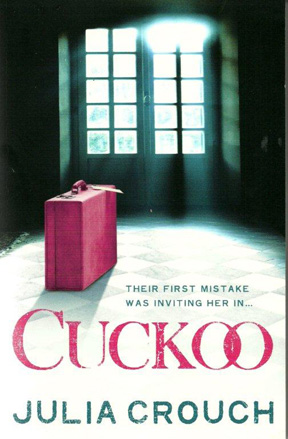
Listed simply as High Heels and Book Deals, Shadepoint and Catherine, Caffeinated; these, I believe, are what the young people call ‘blogs’ and they seem to have certain things in common. They are all written by women, they all share a love of mystery (even horror) fiction and reference shoes, coffee and the colour pink.
Even the most unobservant reader could not fail to spot the use of pink in the cover design and it automatically brings to my mind the book Nightmare in Pink by the late, great John D. MacDonald – part of his classic ‘Travis McGee’ series.
However, as with John D. MacDonald, don’t be fooled by the use of pink when it comes to Cuckoo, for this is a dark, psychological thriller of domestic middle-class angst and is set very much in Ruth Rendell/Morag Joss territory rather having anything to do with being Legally Blonde.
WISE ADVICE
My old friend and fellow boulevardier, the late Auberon Waugh once told me that the best advice his father Evelyn ever gave aspiring writers of fiction was ‘never kill off your best characters’ as good characters are awfully difficult to come up with.
It is wise advice and has been gloriously followed by Carl Hiaasen (possibly the funniest crime writer ever) in Star Island, published here by Sphere.
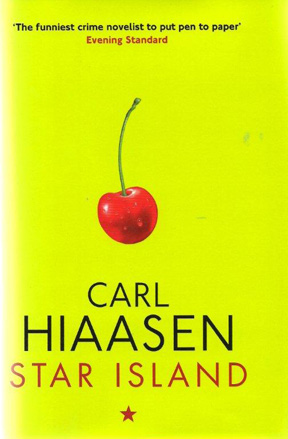
Hiaasen has been charting the social and ecological devastation of his beloved native Florida for over thirty years now, his weapons of choice being savage satire and black humour. To say that Star Island sees him back on top form may sound patronising, but it is meant as a compliment, for Hiaasen on top form – as in earlier books such as Tourist Season, Double Whammy and Skin Tight – really is saying something. Dedicated fans will also be delighted to welcome the return of two of his most memorable characters: the unhinged former Governor of Florida ‘Skink’, who now lives in a crocodile swamp on a diet of road-kill; and the awesomely disfigured ‘Chemo’ who, among other misfortunes, has had one hand removed by a hungry barracuda and uses a battery-powered ‘weed-whacker’ (lawn strimmer) as a prosthetic limb.
Hiaasen’s specific targets in Star Island – apart from the obligatory property-developers – are: the paparazzi, the overwhelmingly vacuous culture of fame and celebrity and the pop music industry where having talent is the least requirement for success. Suffice it to say he has a ball in dishing the dirt on all of them and has not only revived two larger-than-life characters from earlier work, but invented a positively stellar cast of new loonies, including: a drug-addled total airhead 22-year-old pop princess, her super-creepy manager and her ultra-ruthless showbiz mother, a pair of cosmetically enhanced twins who are the public relations divas from hell and a grossly obnoxious photographer prepared to do almost anything for that one ‘money shot’ which will make his career, though of course that depends on the pop star’s career ending badly, and ideally in a place where the lighting can be controlled. In amongst this human circus he drops heroine Ann DeLusia, an underachieving actress who is so cool and generous of heart, she is obviously in the wrong business.
|
Almost twenty years ago, over a very civilised dinner (too civilised – it was a Swedish restaurant!) in London, Carl presented me with his latest novel and inscribed it with the warning that if I ever visited Florida, I should “watch out for the dolphins!”
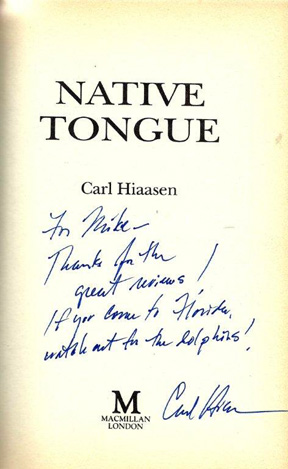
It was a reference to our discussion on the violence meted out in his books to – but more often by – animals, usually wild ones and in particular to his use over an over-amorous dolphin as a murder weapon! In the past he has famously used a stuffed Marlin as a murder weapon (something which almost certainly cost him a Crime Writers Association Last Laugh Award thanks to squeamish judges) and who can forget the pivotal role played by a dead, decapitated pit-bull with rabies and lock jaw in Double Whammy?
In Star Island, the lethal animal count is relatively low, although in Florida one should always be wary of buttock-munching lemon sharks and stay well clear of women who insist on taking their small dogs with them when they travel. Most of the (often hysterically funny) violence is done human-on-human, sometimes with a cattle-prod, though Hiaasen just had to make an exception for the crooked property-developer who has an up-close and far-too-personal encounter with a sea-urchin.
This is Hiaasen red in tooth and claw and outrageously funny to boot.
THE SPIES HAVE IT
It was with some trepidation that I ventured up to the Metropolis and into the depths of Notting Hill (an area known in the 19th century as ‘The Piggeries’ as pigs outnumbered people 3-to1) for the launch of The Trinity Six, the excellent new spy novel by Charles Cumming.
I fully expected the lunch party – held in a “bookshop” – to be crawling with spies, for Charles is a well-known target of the Intelligence Services and I was not wrong. Cunningly, I blended in by standing perplexed, as if trying desperately which wine bar I had left my ‘secure’ lap-top in and was immediately assumed to be a member of MI6.
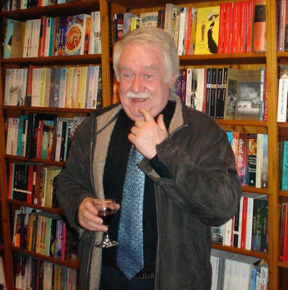
My cover remained intact for the rest of a very pleasant evening as the Safe House as everyone called it (though the sign said ‘Daunt’s Bookshop’) positively heaved with agents: MI5, CIA, MSS (China) and a fair sprinkling of FSB, though I failed to recognise any of my old sparring partners from the old OGPU days.
Even though secret documents, microfilm and code words were being exchanged quite openly, Charles kept up his ‘cover’ by signing hundreds of copies of his new novel to thinly-disguised agents acting as ‘customers’.
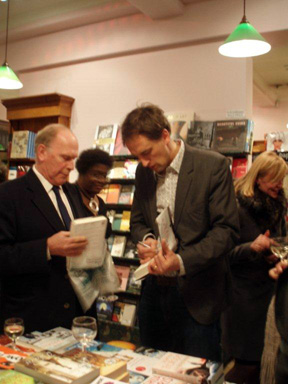
As I have already reported, it is a very good book, with a cracking female agent character, and is stuffed with accurate ‘tradecraft’. Perhaps too accurate....
COMPETITION TIME
The editor of this esteemed organ, Mike ‘Tombstone’ Stotter, has shown his cruel and unusual streak by suggesting that we run this photograph of young, budding crime writers, taken back in the last century, with the question: Which of these crime writers has NOT been awarded the Cartier Diamond Dagger for lifetime achievement?

I will, of course, treat such a suggestion with the contempt it deserves, whilst at the same time offering warmest congratulations to my old chum Lindsey Davis who is to pick up the Diamond Dagger (or should that be gladius in her case?) at a star-studded ceremony later this year, although for legal reasons it is unlikely I will be in attendance.
OUT OF AFRICA
I am seriously looking forward to Roger Smith’s third novel Dust Devils, which is promised from Serpent’s Tail in September.

I was mightily impressed with his second, Wake Up Dead, when it came out here last year and confirmed my theory that South Africa is now a major player in crime fiction geo-politics. However, I have still to see hide or hair of his first novel, Mixed Blood, which has received rave reviews wherever published except here in the UK where it has yet to appear. A little bird tells me that it is slated to appear in May; and though I have had no confirmation of this, I am keeping my fingers crossed.
In the meantime, I will certainly recommend to anyone who will listen (and indeed complete strangers if need be) the third part of Mike Nicol’s Cape Town trilogy, Black Heart, out now from those go-head people at Old Street Publishing down in glorious Devon.
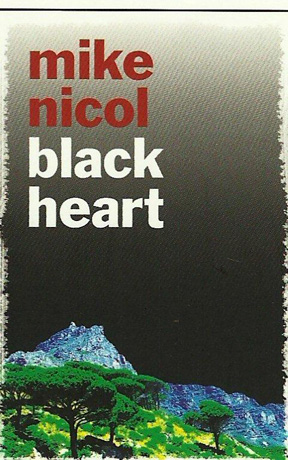
Nicol’s tough-guy buddy heroes Mace Bishop and Pylon Buse are certainly a crime fiction duo worthy to be spoken of in the same breath as the late Robert Parker’s Spenser and Hawk or Robert Crais’ Cole and Pike; plus, Nicol has created in Sheemina February one of the best – and scariest – female villains I have had nightmares about recently and his skill with tough, hard-boiled dialogue is to be envied.
The Cape Town trilogy – Payback, Killer Country and now Black Heart – guarantees Mike Nicol a place in the firmament of South African crime writing stars, along with Roger Smith, Deon Meyer and, for those with discerning taste and a good memory, the veteran Wessel Ebersohn, whose new thriller (his first in twenty years) The October Killings does not appear to have a British publisher.
What a pity. If only he was Scandinavian.....
MURDER ON THE CRIME EXPRESS
Crime Express is an innovative imprint of the Nottingham based Five Leaves Publications (www.fiveleaves.co.uk) which is re-launching itself in April with four novellas (hence ‘express’) aimed at the busy, time-poor reader and very reasonably priced at £4.99 each.
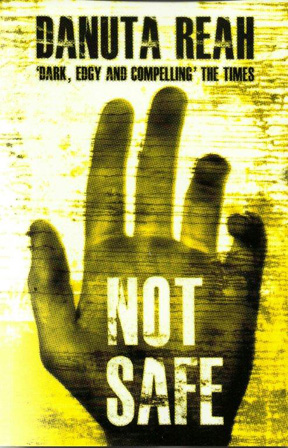
The titles chosen for the re-launch include Stephen Booth’s Claws (which sold out its first edition), Craven Image by Charlie Williams, California by Scottish hard-boiled noirista Ray Banks and Not Safe by former Crime Writers Association supremo Danuta Reah.
HAPPY ENDING
As my regular reader well knows, I always try to end this column on a happy, upbeat note.
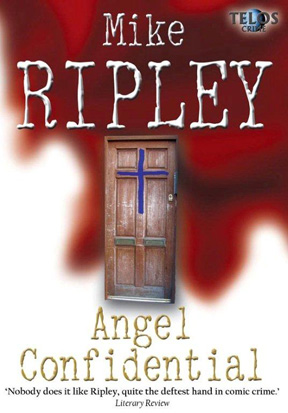
And what could possibly be more upbeat or happier than the announcement that those wonderful people at Telos Books are reissuing two of my ‘Angel’ titles from those far off days of 1994 and 1995: Angel City and Angel Confidential?
Well, I’m happy about it.
Toodles!
The Ripster
|